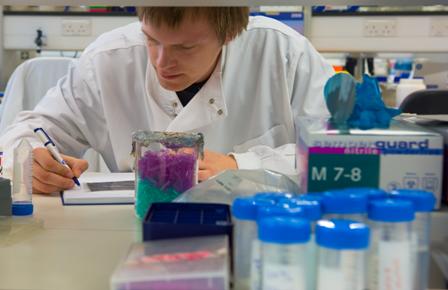Minister David Willets has announced £9 million support for biosciences postgraduate training through a Doctoral Training Partnership (DTP) award to a consortium of the Universities of Liverpool, Newcastle and Durham.
The three universities will together receive £4.5 million from the Biotechnology and Biological Sciences Research Council, (BBSRC), which will be matched by £4.5 million raised from other sources. This will support 45 PhD students over the next three years.
This DTP is one of 14 across the UK supported by £67 million of new investment in postgraduate training and development in the biosciences by BBSRC. It has also announced a number of industrial CASE (iCASE) studentship awards.
The programmes will provide highly skilled scientists for academia, policy and industry and support the BBSRC mission to further scientific knowledge for economic growth, wealth and job creation – improving the quality of life in the UK and beyond.
Professor Graham Kemp, Director of Postgraduate Research in the University’s Faculty of Health and Life Sciences, said: “This is a major investment in high-quality training for bioscientists, and it’s good news for Liverpool, which will benefit from about £3.5 million of the total investment. Training will focus on world-class research in national strategically important research areas, including into lifelong health and wellbeing, diet and health, microbial food safety, animal health and welfare, and crop science. It will attract top-class young scientists from all over the country and beyond. We look forward to working with our partners in the North-East on this wonderful development”.
Minister for Universities and Science, David Willetts, speaking about the national investment, said: “This £67 million investment in postgraduate training is excellent news for students, research organisations, industry and the UK as a whole. The brightest and best students will be finding solutions to some of the biggest challenges facing us all, from food security through to renewable energy.
“The partnership approach means that many institutions are combining their strengths to provide students with improved training and relevant work experience. This will better equip them for future careers, be it in research, industry, or elsewhere.”
The DTPs represent a new, more strategic approach from BBSRC to deliver highly skilled scientists for the UK research base. Taken as a whole, the DTP programme will deliver scientists with the training to meet major social and economic challenges in food security, sustainable bioenergy and renewable materials and improving lifelong health and wellbeing, as well as supporting those undertaking research in core underpinning bioscience.
An innovative and integral element of the programme, built in to enhance the employability of the DTP students, is the requirement for them to undertake a three-month professional internship outside of the lab to widen their experience of the areas of work in which they can apply their PhD skills and training. Destinations for these internships will include policymaking, media, teaching and industry.
BBSRC will be working closely with each DTP to support the delivery of excellent training and facilitate the development of a cohort of highly skilled BBSRC early career scientists. To provide greater support for the research training costs of each student, and to recognise rising research inflation, BBSRC is awarding significantly higher research training grants for each student of £5,000 per student, per year.
Dr Celia Caulcott, BBSRC Director of Innovation and Skills said: “We believe that this approach is a great way of doing things, enabling us to support the very best students working in the most important areas from food security through to crucial underpinning bioscience.
“DTPs are all about training researchers to be the best they can be. By doing this we can make real inroads into answering global conundrums which will ultimately have a massive impact on the UK economy and further afield.”
